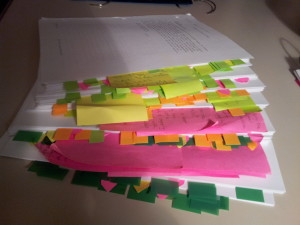 This is what I’m facing in Book II edits right now. So. Many. Stickies.
This is what I’m facing in Book II edits right now. So. Many. Stickies.
The good news is most of it is small stuff, quick and easy to fix. This is actually the compiled feedback from three different readers and some of my own notes. Which brings me to the topic of today’s post: When to hire an editor.
The bulk of writing for many authors occurs after drafting. There’s a spectrum here; some first drafts are like solid blocks of clay that must now be shaped into books. Others are nearly finished, and just need a little cleaning and polishing before they’re ready for release. And then there are all stages in between.
No matter where your draft lies on that spectrum, you’re going to need help at some point. For the sake of this post I am assuming that your goal with writing is to communicate and perhaps to sell books. If your goal is writing purely for personal development, you might not need an editor.
In order to know when to hire an editor and what kind of editor to hire, you have to understand the stages of revision. I posted them a while ago but I’ll recap for the sake of this post:
1. Re-Writing: Re-Writing is the stage where you make dramatic changes to work you’ve drafted. It can include cutting entire sections and adding in whole new sections, removing or dramatically changing plotlines or characters, or completely re-thinking the direction of your story.
2. Revising: Revising is the stage where you make changes to a draft that are less dramatic than a re-write, but still on the scene level rather than the line level. Revision often encompasses changes made to improve the pacing, flow, clarity, and tension of the story. In a revision, the plot, characters, setting and theme essentially remain unchanged but are more clearly illustrated. For example, in a revision, you might add in a scene showing how evil the villain is, but you aren’t changing the nature of the character.
3. Line Edit: A line edit encompasses changes made on the sentence level to improve the readability of the book. Line editing is about restructuring syntax to state things more clearly, or with fewer words. It can include removing cliches, over-used words, and repetitive phrases. Line editing is essentially about style, where copy-editing and proofreading are about being technically correct.
4. Copy Edit: Copy-editing is all about the technical details, making sure the text is grammatically correct, usage is consistent, facts are correct.
5. Proofreading: Proofreading is the very last stage before distribution. It means looking over everything, from the content to the formatting, to be sure it is error free. You should avoid making any large changes after proofreading, or you run the risk of introducing new errors to a proofread book.
So, at what stage in this process should you hire an editor? In my experience, it depends on a couple of things: first, where the key weaknesses in your own writing and editing abilities lie, and second, how much, and what kind, of editing you can get in trade.
The truth is, you’re probably not going to make a ton of money on your first book, at least not right away. And editing can be expensive. But if you want to make any money at all, and more importantly if you want readers to pick up your second book, you need a book that has been well-edited.
For me, the answer to this conundrum has largely been to trade editing with fellow writers; however, I hired a developmental editor for Dream of a Vast Blue Cavern and I’m really glad I did. I felt like my peers had done all they could with it and I needed professional advice. The feedback I got was both comprehensive and encouraging. Often peers are really good at finding problems in your work, but not so good at coaching you through how to solve those problems. A good editor won’t just point out the shortcomings of your work, she will offer concrete solutions that both respect and enhance the work. A good editor should believe in your work and understand it, and you should be able to trust the editor’s advice because of that.
I don’t regret hiring a professional editor for Book I because I learned so much from the experience, and it definitely resulted in a greatly improved product.
Since then, a couple of things have changed; my own editing skills have vastly improved, and my writing community has grown, both in number and in editing ability and scope. So, for Dream of a City of Ruin, I’m relying on my own skills and the goodwill of my writing community. One of my writing buddies has read through a couple of drafts and given me feedback that is on par with a professional developmental editor–for free. Several other writing buddies have been kind enough to read all five hundred pages and offer feedback. One of them even gave me an extensive line edit–for free. Yes, I am that lucky.
But it wasn’t just luck; I’ve been proactive over the years to build my writing community. If you don’t have a writing community now, I suggest working to accumulate it. Start participating in writing groups, either online or local, where writers trade critiques on small pieces. When you find specific writers whose critiques are especially useful and, most importantly, address the areas that you are weak in editing yourself, approach them to trade critiques on longer works. Be generous with your time; critiquing the works of others will only improve your own skills.
Now, even if you have several writing buddies who give you excellent perspective and feedback on your work, I still recommend hiring a professional editor at least once (if you can afford it). You’ll learn things from working with an editor that can help you strengthen the weaknesses in your own editing skills. And once you’ve strengthened those weaknesses, you may not need to hire that kind of editor again. If you are proactive in understanding why the editor is telling you to make certain changes, the editing of the first book will “pay” for the editing of every book you write thereafter.
What kind of editor should you hire?
When you approach a professional editor, it is crucial to understand clearly what services they are offering. The first two stages of revision, re-writing and revising, fall under the realm of a Developmental Editor. The last three stages are fully distinct types of editing and while these same services might be offered by the same person, you need to make it clear upfront what services you expect from them.
You should hire an editor based on the weakest link in your piece of writing. If you are really strong in grammar and style, you probably don’t need to hire a line or copy editor. If you are confident that your story doesn’t have any developmental holes to sort out–gaps in the plot, issues with character development, problems with flow and pacing–then you won’t need a developmental editor. Figure out what the weakest part of the draft is and hire to fix that.
The one aspect of editing you always need help with is proofreading. You simply won’t catch every error on a draft you have been staring at for years. If you can afford it, hire it. If you can’t, rely on beta readers, not necessarily other writers but simply readers who love catching errors. After I published Dream of a Vast Blue Cavern, my mother handed me a page of notes covering errors she had found in the book. This time around, I’m giving her the book to proof before I release it.
The key thing is that the stronger your editing skills and your writing community, the less you’ll pay in editing. In light of that fact, the next twenty posts or so are going to cover everything I’ve learned over the years about rewriting, revising, line editing, copy editing, and proofreading. So stay tuned–you might just learn something that will save you a buck or two.
It all starts in the next post: 101 TIWIK #56: Rewriting: Molding the Block of Clay


